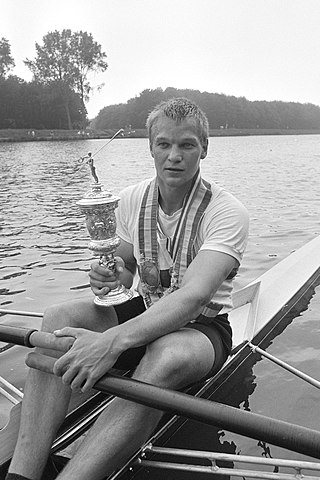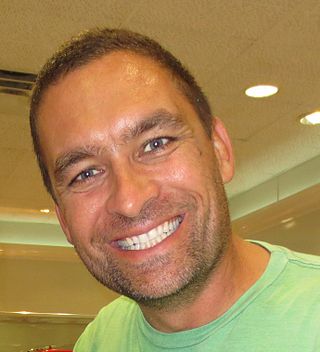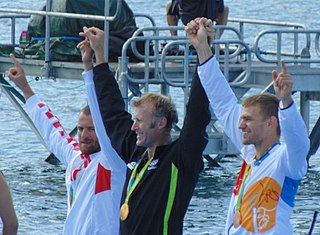
Olaf Karl Tufte is a Norwegian rower, firefighter, and farmer. He is a seven-time Olympian, and as a single sculler he was twice the Olympic champion and twice the world champion. He has been consistently selected to the Norwegian men's senior national rowing squad since 1996, including his selection as a 2020 Tokyo Olympian – where he made his seventh Olympic appearance, racing in the men's quadruple sculls.

The men's single sculls competition at the 2004 Summer Olympics took place at Schinias Olympic Rowing and Canoeing Centre, Greece. The event was held from 14 to 21 August and was one of six events for male competitors in Rowing at the 2004 Summer Olympics in Athens. There were 29 competitors from 29 nations, with each nation limited to a single boat in the event. The event was won by Olaf Tufte of Norway. Silver went to Jüri Jaanson of Estonia, with bronze to Ivo Yanakiev of Bulgaria. It was the first medal in the men's single sculls for all three nations. Marcel Hacker's failure to make the final made this the first men's single sculls race since 1956 without a German rower on the podium; between the United Team of Germany, East Germany, West Germany, and Germany, the German medal streak in the event had been 11 Games long.
Women's single sculls competition at the 2008 Summer Olympics in Beijing was held between August 9 and 16, at the Shunyi Olympic Rowing-Canoeing Park.

The men's single sculls competition at the 1992 Summer Olympics in Barcelona was held from 27 July to 1 August at Lake of Banyoles. The event was an open-style, individual rowing event conducted as part of the Rowing at the 1992 Summer Olympics programme. There were 22 competitors from 22 nations, with each nation limited to a single boat in the event. The event was won by Thomas Lange of Germany, the fourth man to successfully repeat as Olympic champion. It was the first appearance of "Germany" since 1936, though German rowers representing the United Team of Germany, West Germany, and East Germany had won 10 medals in 8 Games from 1960 to 1988. Václav Chalupa of Czechoslovakia took silver, that nation's first medal in the men's single sculls. Poland's Kajetan Broniewski earned that nation's first medal in the event since 1960 with his bronze.

The men's single sculls competition at the 2012 Summer Olympics in London took place at Dorney Lake which, for the purposes of the Games venue, was officially termed Eton Dorney. It was held from 28 July to 3 August. There were 33 competitors from 33 nations. The event was won by Mahé Drysdale of New Zealand, the nation's first victory in the event since 2000. Ondřej Synek of the Czech Republic earned his second consecutive silver in the event; Drysdale and Synek were the 13th and 14th men to win multiple medals in the single sculls; they would go on to be the 5th and 6th to earn three in the event in 2016 when Drysdale repeated as champion and Synek added a bronze. The 2012 bronze went to Alan Campbell, Great Britain's first medal in the event since 1928.

The men's single sculls competition at the 1972 Summer Olympics in Munich took place from 27 August to 2 September at the Olympic Reggatta Course in Oberschleißheim. There were 18 competitors from 18 nations, with each nation limited to a single boat in the event. The event was won by Yury Malyshev of the Soviet Union, the nation's fifth victory in the event; the Soviets returned to the top of the podium after having their four-Games (1952–1964) winning streak broken in 1968. Alberto Demiddi of Argentina took silver, the seventh man to win multiple medals in the single sculls. Wolfgang Güldenpfennig earned bronze, the first medal for East Germany as a separate team.

The men's coxed pair competition at the 1972 Summer Olympics in Munich took place from 27 August to 2 September at the Olympic Regatta Course in Oberschleißheim. There were 21 boats from 21 nations, with each nation limited to a single boat in the event. The event was won by East German crew Wolfgang Gunkel, Jörg Lucke, and coxswain Klaus-Dieter Neubert; it was the first medal in the event for East Germany as a separate nation. Czechoslovakia (silver) and Romania (bronze) also won their first medals in the men's coxed pair.

The men's coxed four competition at the 1972 Summer Olympics in Munich took place from 27 August to 2 September at the Olympic Reggatta Course in Oberschleißheim. There were 14 boats from 14 nations, with each nation limited to a single boat in the event. The event was won by West Germany; it was the nation's first medal as a separate team, but the third time in four Games that a West German crew had won gold. East Germany repeated as silver medallists, though with a new crew. Bronze went to Czechoslovakia, the nation's first medal in the men's coxed four since 1952.
The women's single sculls competition at the 2000 Summer Olympics in Sydney, Australia took place at the Sydney International Regatta Centre.

The men's single sculls competition at the 2000 Summer Olympics in Sydney, Australia took place at the Sydney International Regatta Centre. It was held from 17 to 23 September. There were 24 competitors from 24 nations, with each nation limited to a single boat in the event. The event was won by Rob Waddell of New Zealand, the nation's first victory in the event after bronze medals in 1920 and 1988. Defending champion Xeno Müller of Switzerland placed second, becoming the 11th man to win multiple medals in the event. Marcel Hacker of Germany took bronze; it was the 11th consecutive Games with a German rower on the podium in the event.

The men's single sculls competition at the 1956 Summer Olympics took place at Lake Wendouree, Ballarat, Australia. The event was held from 23 to 27 November. There were 12 competitors from 12 nations, with each nation limited to a single boat in the event. The event was won by Vyacheslav Ivanov of the Soviet Union, the nation's second consecutive victory in the men's single sculls Ivanov's first of his three consecutive Olympic titles. He was so thrilled when he was presented with his gold medal that he jumped up and down with joy-and dropped the medal into Lake Wendouree. He immediately dived into the lake to retrieve it, but could not find it. After the games were over he was given a replacement medal. Stuart Mackenzie took silver, making it the second consecutive Games with an Australian runner-up. American John B. Kelly Jr., after missing the finals in 1948 and 1952 by 0.4 seconds and 0.2 seconds respectively, reached the final and took the bronze medal this time.

The men's single sculls competition at the 1968 Summer Olympics took place at Virgilio Uribe Rowing and Canoeing Course, Mexico. The event was held from 15 to 19 October. There were 17 competitors from 17 nations, with each nation limited to a single boat in the event. The event was won by Jan Wienese of the Netherlands, with Jochen Meißner of West Germany taking silver and Alberto Demiddi of Argentina earning bronze. It was the first medal in men's single sculls for each of the three nations. The Soviet Union's four-Games winning streak in the event ended; three-time champion Vyacheslav Ivanov was left off the team in favor of Viktor Melnikov; Melnikov finished fourth in his semifinal and did not reach the main final.

The men's single sculls competition at the 1976 Summer Olympics took place at Notre Dame Island Olympic Basin, Canada. The event was held from 18 to 25 July. There were 15 competitors from 15 nations, with each nation limited to a single boat in the event. The event was won by Pertti Karppinen of Finland, the nation's first medal in the men's single sculls. Karppinen would go on to win three consecutive golds in the event, matching the Soviet Union's Vyacheslav Ivanov who did the same from 1956 to 1964. Silver went to Peter-Michael Kolbe of West Germany; East Germany took its second consecutive bronze medal in the event, this time with Joachim Dreifke as the rower.

The men's single sculls rowing competition at the 1980 Summer Olympics took place at Krylatskoye Sports Complex Canoeing and Rowing Basin, Moscow, Soviet Union. The event was held from 20 to 27 July. There were 14 competitors from 14 nations, with each nation limited to a single boat in the event. The event was won by Pertti Karppinen of Finland, his second of three consecutive victories from 1976 to 1984. Karppinen was the eighth man to win multiple medals in the event. Silver went to Vasil Yakusha of the Soviet Union, the nation's sixth medal in eight Games. East Germany took a third consecutive bronze medal, all by different rowers as Peter Kersten was the nation's men's single sculler this Games.

The men's single sculls competition at the 1984 Summer Olympics took place at Lake Casitas, California, United States of America. The event was held from 31 July to 5 August. There were 16 competitors from 16 nations, with each nation limited to a single boat in the event. The event was won by Pertti Karppinen of Finland, his third consecutive victory. Silver went to Peter-Michael Kolbe of West Germany; Kolbe, who had also taken silver in 1976, was the ninth man to earn multiple medals in the single sculls and the first to do so in non-consecutive Games. Canada earned its first medal in the event since 1912 with Robert Mills's bronze. East Germany's three-Games podium streak ended with no rowers from that nation present due to the Soviet-led boycott.

The men's single sculls competition at the 1988 Summer Olympics took place at Misari Regatta, South Korea. The event was held from 19 to 24 September. It was the 20th appearance of the event, which had been held at every Olympic Games since the introduction of rowing in 1900. NOCs were limited to one boat apiece; 22 sent a competitor in the men's single sculls. Thomas Lange of East Germany won the event, denying Pertti Karppinen a record fourth-straight win and starting a two-Games winning streak of his own. Peter-Michael Kolbe of West Germany took his third silver, joining Karppinen and Vyacheslav Ivanov as three-time medalists in the event. New Zealand earned its first medal in the event since 1920, with Eric Verdonk taking bronze.

The men's single sculls competition at the 1996 Summer Olympics took place at Lake Lanier, Atlanta, United States of America. The event was held from 21 to 27 July 1996. There were 21 competitors from 21 nations, with each nation limited to a single boat in the event. The event was won by Xeno Müller of Switzerland, the nation's first victory in the event and first medal of any color since 1960. Derek Porter's silver was Canada's best-ever result in the event, over bronze medals in 1912 and 1984. Two-time defending champion Thomas Lange of Germany settled with a bronze medal this time, becoming the fourth man to win three medals in the event.

The men's single sculls competition at the 2016 Summer Olympics in Rio de Janeiro was held from 6 to 13 August at the Lagoon Rodrigo de Freitas. There were 32 competitors from 32 nations. The event was won by Mahé Drysdale of New Zealand, the sixth man to successfully defend an Olympic title in the event. He won an exceptionally close final against Damir Martin of Croatia. Martin's silver was Croatia's first medal in the event. Bronze went to Ondřej Synek of the Czech Republic. Both Drysdale and Synek earned their third medal in the event; Drysdale had taken bronze in 2008 before winning in 2012 and 2016, while Synek had twice been the runner-up in 2008 and 2012 before this third-place finish.

The men's single sculls event at the 2020 Summer Olympics took place from 23 to 30 July 2021 at the Sea Forest Waterway. 32 rowers from 32 nations competed.

The women's single sculls event at the 2020 Summer Olympics took place from 23 to 30 July 2021 at the Sea Forest Waterway. 32 rowers from 32 nations competed.















